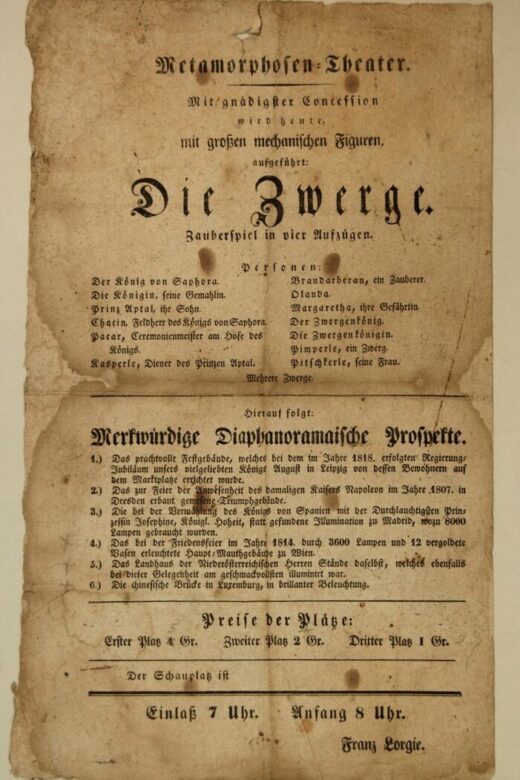
Manuscript
63 pages
Die Zwerge
The only known manuscript of this play originally belonged to Dresde puppeteer Franz Anton Lorgie (1765-1853). It may have been written in the mid-1700s and is of unknown authorship. The central characteristics of the play include a great number of metamorphoses, quick-change sceneries, comic twists and special attention paid to the role of Kasper. Lorgie’s manuscript was acquired by puppeteer Friedrich Albert Apel (1847-1905) and, in 1887, by Arthur Kollman, a collector of puppet plays. It is now kept at the Puppentheatersammlung in Dresde (classification number D4-701).
Dwarfs help a young girl escape an incestuous marriage
Prince Abdal and his servant Kasper are lost in an enchanted forest. Kasper eats all the supplies while his master cannot satisfy his hunger. For three years, the prince has been searching for a woman who appeared to him in a dream. Then the king of the dwarfs and his subjects appear to the two men. The woman they are looking for is Princess Olanda, who is held captive in the forest by the magician Brandarbaran. They decide that Kasper will kill the magician, while Prince Abdal saves the princess. They are both given magical objects, and the dwarfs offer to help them. Kasper goes back to court using an invisibility cloak, and delivers fake news – that his master has died – then disappears. Olanda has been held captive for three years in Brandarbaran’s dungeon. Although she was treated like a princess in all respects by her maid Margaretha, she was raised by poor people. Brandarbaran tries to seduce her, but she resists him. Since this will cause him to look powerless, he decides to kill her. Prince Abdal and Kasper are at the foot of the dungeon, and about to fulfill their mission. Pimperle and Pitschkerle, two dwarfs, come to their aid and put the dragon to sleep. But Kasper does not succeed in killing the magician: in fact, the dwarfs did not wish him to, because Brandarbaran is actually Olanda’s father! Brandarbaran gives Kasper and Olanda their blessing. The maid Margaretha recognises Kasper: he is her husband, who ran away years before. They reconcile after quarrelling several times.